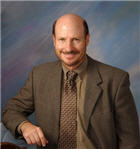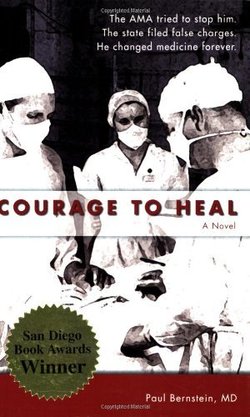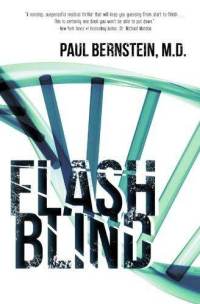I’ve known Dr. Paul Bernstein ever since he and his wife, Judy, joined a read & critique group that I facilitated back in the ’90s. Both have since been published, their initial books receiving much critical acclaim. While some people  think that surgeons often sit high atop their Medical Mount Olympus, Paul is one of the nicest, down-to-earth guys you would ever want to meet. He recently took time from his insane schedule to answer some questions and discuss Flashblind, his latest medical thriller.
think that surgeons often sit high atop their Medical Mount Olympus, Paul is one of the nicest, down-to-earth guys you would ever want to meet. He recently took time from his insane schedule to answer some questions and discuss Flashblind, his latest medical thriller.
Talk about your medical background.
PB: I’m a graduate of the University of California (UCSD) medical school and completed my residency in Head and Neck Surgery at University Hospital in San Diego. I’m board certified in Head and Neck Surgery and a fellow in both the American College of Surgeons and the American Academy of Facial Plastic Surgery.
I am the Area Medical Director for Kaiser Permanente San Diego and past Regional Chief of Head and Neck Surgery for Southern California. My medical awards include the Physicians’ Exceptional Contribution Award (Partner of the Year) in 2005 and the Schilling Award for Compassionate Care in 2007.
I’m an assistant clinical professor with UCSD’s Department of Head and Neck Surgery and started the Mohs Surgery Program in San Diego. I’ve been the Chairman of the Head and Neck Division of the American Cancer Society for over fifteen years and was awarded the ACS Community Service Award twice.
When and why did you decide to start writing novels?
PB: I started writing novels in the 1990s. As a history major at UCLA before medical school, I enjoyed writing and  telling an interesting story. Your read & critique groups were inspiring and your teaching invaluable in helping me take my skills from an average story teller to an engaging author.
telling an interesting story. Your read & critique groups were inspiring and your teaching invaluable in helping me take my skills from an average story teller to an engaging author.
Your critically acclaimed first published novel, Courage to Heal, was based on a true story. Talk about your motivation for telling this story.
PB: As a physician at Kaiser Permanente for over twenty-five years, I was amazed at our unique, exciting, and truly amazing history. A story of how one man changed American medicine forever. A story that had never been written or told. For us to really change the current health care crisis, we need to understand Dr. Sidney Garfield, his thinking, his life, and his struggles against a system that was based and is still based on fees, not health or wellness.
Your new novel Flashblind, is a medical thriller. Talk a bit about the storyline, and also what inspired you to write this story.
PB: As in Courage to Heal, Flashblind (ZOVA Books) tells a story in American history that few know about: how our government for years used unsuspecting people as guinea pigs in human radiation experiments. This was finally made public through the Freedom of Information Act, and I found the seven volumes absolutely riveting. Add the fact that the human genome, our genetic code, was analyzed and sequenced, not in Boston or New York or Los Angeles but in the same small town in New Mexico that the atomic bomb was first built: Los Alamos. Why in the world would our government sponsor such important research in this remote location? Why would it be under  the supervision of the Department of Energy and not the National Institutes of Health, where all other human research is conducted? This forms the background of the struggle of Jake Holden, one of the world’s leading geneticists in his struggle to find the cure for his brother’s genetic disorder. The cure that would lead him to discover the genetic Holy Grail and uncover the shocking “true” secret behind our government’s program to develop an antidote to an atomic bomb.
the supervision of the Department of Energy and not the National Institutes of Health, where all other human research is conducted? This forms the background of the struggle of Jake Holden, one of the world’s leading geneticists in his struggle to find the cure for his brother’s genetic disorder. The cure that would lead him to discover the genetic Holy Grail and uncover the shocking “true” secret behind our government’s program to develop an antidote to an atomic bomb.
With your busy schedule, how do you find the time to write?
PB: Writing is about discipline. No matter how busy you are, you can find an hour a day or seven hours a week to write. If you do this consistently, you can complete a novel (at least the first draft) in about a year. I find writing both relaxing and stimulating and look forward each day and especially on the weekends to writing in the “quiet, late hours.”
What aspect of writing in general pleases you the most?
PB: The ability to tell a story. To develop characters and put myself in their differing points of view in different locations and times. The Internet allows me to be anywhere in the world at any time and write it in a credible and believable way. I love writing complex, suspenseful plots, but without a character that the reader can identify with and root for, the story becomes just that: a story, not a novel.
What advice would you give aspiring writers?
PB: Be patient. Don’t get discouraged and keep writing. As Henry Kaiser said, “Think big.” The market today has evolved so much over the last twenty years I’ve been writing. No longer do you need to rely on agents and bookstores. The latter have been disappearing like Blockbuster and Tower Records. Our dreams of walking in a bookstore and seeing our novel on the shelf have been replaced by clicking on Amazon and seeing our novels online. What you need to do is work on the craft of writing. This is where a writing coach like you, or belonging to a read and critique group can make a world of difference. And remember, your first draft is just that, your first. It’s about what you do with it, the multiple rewrites, revisions, and sweat you pour into it that truly makes your work of fiction come alive.
Finally, what do you have in mind for your next project?
PB: I’m working on a screenplay where a down-and-out astrophysics professor turns to preaching to help pay for his wife’s health care. Average plot? Not when you add that the Mars Rover just found a rock matching a drawing that Darwin sketched in his original account on the Voyage of the Beagle. One that pits evolutionists vs. creationists in a modern-day battle over our origins. Fifty percent of Americans in the 21st century still think of Darwin’s concept as evil-ution.

Some of the most inspiring books I’ve read and authors I’ve encounters fall within the thriller genre. Dr. Bernstein and his books sound like prime examples.
Adding “Courage to Heal” and “Flashblind” to my to-read list. Thanks for introducing me to a new (to me) author! 🙂
Just as one day I’ll be introducing YOU to a whole new bunch of readers! 🙂